Invited Speakers (In an alphabetical order)
 |
A.Lee Swindlehurst |
A.Lee Swindlehurst received the B.S. (1985) and M.S. (1986) degrees in Electrical Engineering from Brigham Young University (BYU), and the PhD (1991) degree in Electrical Engineering from Stanford University. He was with the Department of Electrical and Computer Engineering at BYU from 1990-2007, where he served as Department Chair from 2003-06. During 1996-97, he held a joint appointment as a visiting scholar at Uppsala University and the Royal Institute of Technology in Sweden. From 2006-07, he was on leave working as Vice President of Research for ArrayComm LLC in San Jose, California. Since 2007 he has been a Professor in the Electrical Engineering and Computer Science Department at the University of California Irvine, where he served as Associate Dean for Research and Graduate Studies in the Samueli School of Engineering from 2013-16. During 2014-17 he was also a Hans Fischer Senior Fellow in the Institute for Advanced Studies at the Technical University of Munich. In 2016, he was elected as a Foreign Member of the Royal Swedish Academy of Engineering Sciences (IVA). His research focuses on array signal processing for radar, wireless communications, and biomedical applications, and he has over 300 publications in these areas.
Dr. Swindlehurst is a Fellow of the IEEE and was the inaugural Editor-in-Chief of the IEEE Journal of Selected Topics
in Signal Processing. He received the 2000 IEEE W. R. G. Baker Prize Paper Award, the 2006 IEEE Communications Society
Stephen O. Rice Prize in the Field of Communication Theory, the 2006 and 2010 IEEE Signal Processing Society’s Best
Paper Awards, and the 2017 IEEE Signal Processing Society Donald G. Fink Overview Paper Award.
 |
Alfred Hero |
Alfred Hero is the John H. Holland Distinguished University Professor of Electrical Engineering and Computer Science and the R. Jamison and Betty Williams Professor of Engineering at the University of Michigan. He is also co-Director of the University’s Michigan Institute for Data Science (MIDAS).
At the University of Michigan his primary appointment is in the Department of Electrical Engineering and Computer Science (EECS) and he has secondary appointments in the Department of Biomedical Engineering and the Department of Statistics.
He is also affiliated with the UM Center for Computational Medicine and Bioinformatics (CCMB), and the UM Graduate Program in Applied and Interdisciplinary Mathematics (AIM).
His research is on data science and developing theory and algorithms for data collection, analysis and visualization that
use statistical machine learning and distributed optimization. These are being to applied to network data analysis,
personalized health, multi-modality information fusion, data-driven physical simulation, materials science,
dynamic social media, and database indexing and retrieval.
 |
Bowen Zhou |
Bowen Zhou has been the Vice President of Artificial Intelligence Platform & Research of JD.com since September 2017.
Bowen is a technologist and business leader of human language technologies, machine learning, and artificial intelligence. He is keen on creating and advance relevant theory and applications that matter in the real world.
Before joining JD.com, Bowen was with IBM for almost 15 years. In April last year, Bowen was appointed as the Chief Scientist
of Watson Group, where he was responsible to lead and align Watson Group’s science agenda with IBM’s technical strategy and
IBM Research’s cognitive computing and artificial intelligence agenda. As an IBM Distinguished Engineer,
Bowen was an integrated member of the Executive Team of IBM Watson. He was also appointed to be the Director of AI
Foundations, which were founded and launched by Bowen in January 2017, the first horizontal core learning and AI
research lab at IBM Research.
 |
Brian D. Athey |
Brian Athey, PhD. is the Michael A. Savageau Collegiate Professor and Founding Chair of the Department of Computational Medicine and Bioinformatics (DCMB) at the University of Michigan Medical School; where he also is a Professor of Psychiatry and Internal Medicine. In addition, he is co-founder and co-director of the campus-wide Michigan Institute for Data Science (MIDAS), now in its fourth year. Brian earned his Ph.D. in Biophysics at UM in 1990, and has been at UM for 36 years, joining the faculty of the Medical School in 1994. Athey serves as PI of the UM NIGMS T32 UM Bioinformatics Training Program (in Year 13 of 16). The Bioinformatics Graduate Program in DCMB has graduated over 90 Ph.D. students and 65 MS students since 2005. DCMB faculty are deeply committed to translational bioinformatics, genomics, epigenomics, transcriptomics, proteomics, metabolomics, network systems, and multi-scale ‘omics integration research, a focus he launched in 2005 which started Bioinformatics at Michigan and launched the NIH National Center for Biomedical Informatics (NCIBI), which he led for 9 years. In addition, DCMB has recently built significant strengths in biomedical data science, with four new key faculty hires in this area completed in the past 18 months (DCMB currently has 16 primary faculty members and 14 secondary appointees). In 2007 Athey was founding Associate Director of the Michigan Institute for Clinical and Health Research (MICHR), home of the UM Clinical and Translational Science Award (CTSA), where he served as Director of its Biomedical Informatics Core. Athey has served as Acting CIO of the University of Michigan Health System, and also as Director of Academic Informatics for the UM Medical School (2009-2011). He served as the Assistant CIO of the UM for 2 years in the late 1990s.
Athey has more than 20 years of experience in trans-disciplinary team science-based leadership experience as overall Principal Investigator of national biomedical informatics and computational sciences centers and consortia. These include the National Library of Medicine (NLM) Visible Human Project, the DARPA Telepathology and Virtual Solider Projects, and the NIH National Center for Integrative Biomedical Informatics (NCIBI). Trained as a biophysicist, as a graduate student.
Athey proposed the double helical crossed-linker model for chromatin, now considered by most to be its correct structural motif.
Earlier in his career, Athey was considered to be an expert in microscopic biological imaging and scattering, and is an expert
in several of modalities of microscopy from electron to 2-photon. For nearly 10 years, shared a laboratory with Professor Emmett
Leith, the internationally renowned inventor of off-axis Holography, with whom he trained 2 PhD. students. Athey has trained over
10 PhD students and has over 100 peer- reviewed papers and conference proceedings. He is currently an active researcher in
‘pharmacoepigenomics’, a field he helped establish, and he is a leader in the field of neuropsychiatric pharmacogenomics.
Brian has previously served as chair of the Scientific Advisory Board (SAB) of Assurex Health (7 years), recently acquired by
Myriad Genetics. Athey has served as a consultant to the Defense Science Office of DARPA (6 years), and to the NIH Office of
the Director (OD) and the NIH CIO (3.5 years). In the late 1990s, Brian was awarded the Peace Fellowship from the Federation
of American Scientists (FAS) for his work with DARPA to prevent biological terrorism. Brian is an elected fellow of the American
College of Medical Informatics (FACMI). Dr. Athey currently serves as a life and medical sciences consultant to the Chinese
University Hong Kong-Shenzhen (CUHK-SZ).
 |
Daniel P.Palomar |
Daniel P.Palomar received the Electrical Engineering and Ph.D. degrees from the Technical University of Catalonia (UPC), Barcelona, Spain, in 1998 and 2003, respectively, and was a Fulbright at Princeton University.
He is a Professor in the Department of Electronic and Computer Engineering at the Hong Kong University of Science and Technology (HKUST), Hong Kong, which he joined in 2006. He had previously held several research appointments, namely, at King's College London (KCL), London, UK; Stanford University, Stanford, CA; Telecommunications Technological Center of Catalonia (CTTC), Barcelona, Spain; Royal Institute of Technology (KTH), Stockholm, Sweden; University of Rome “La Sapienza”, Rome, Italy; and Princeton University, Princeton, NJ.
His current research interests include applications of convex optimization theory and signal processing to financial systems and big data analytics.
Dr. Palomar is an IEEE Fellow, a recipient of a 2004/06 Fulbright Research Fellowship, the 2004 and 2015 (co-author) Young Author Best Paper Awards by the IEEE Signal Processing Society, the 2015-16 HKUST Excellence Research Award, the 2002/03 best Ph.D. prize in Information Technologies and Communications by the Technical University of Catalonia (UPC), the 2002/03 Rosina Ribalta first prize for the Best Doctoral Thesis in Information Technologies and Communications by the Epson Foundation, and the 2004 prize for the best Doctoral Thesis in Advanced Mobile Communications by the Vodafone Foundation and COIT.
He has been a Guest Editor of the IEEE JOURNAL OF SELECTED TOPICS IN SIGNAL PROCESSING 2016 Special Issue on “Financial
Signal Processing and Machine Learning for Electronic Trading”, an Associate Editor of IEEE TRANSACTIONS ON INFORMATION
THEORY and of IEEE TRANSACTIONS ON SIGNAL PROCESSING, a Guest Editor of the IEEE SIGNAL PROCESSING MAGAZINE 2010 Special
Issue on “Convex Optimization for Signal Processing,” the IEEE JOURNAL ON SELECTED AREAS IN COMMUNICATIONS 2008 Special
Issue on “Game Theory in Communication Systems,” and the IEEE JOURNAL ON SELECTED AREAS IN COMMUNICATIONS 2007 Special
Issue on “Optimization of MIMO Transceivers for Realistic Communication Networks.”
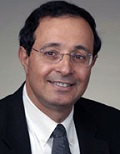 |
David Simchi-Levi |
David Simchi-Levi is a Professor of Engineering Systems at MIT. He is considered one of the premier thought leaders in supply chain management and business analytics.
His research focuses on developing and implementing robust and efficient techniques for operations management. He has published widely in professional journals on both practical and theoretical aspects of supply chain and revenue management.
His Ph.D. students have accepted faculty positions in leading academic institutes including U. of California Berkeley, Columbia U., Cornell U., Duke U., Georgia Tech, Harvard U., U. of Illinois Urbana-Champaign, U. of Michigan, Purdue U. and Virginia Tech.
Professor Simchi-Levi co-authored the books Managing the Supply Chain (McGraw-Hill, 2004), the award winning Designing and Managing the Supply Chain (McGraw-Hill, 2007) and The Logic of Logistics (3rd edition, Springer 2013). He also published Operations Rules: Delivering Customer Value through Flexible Operations (MIT Press, 2011).
Professor Simchi-Levi is the current Editor-in-Chief of Management Science, one of the two flagship journals of INFORMS. He served as the Editor-in-Chief for Operations Research (2006-2012), the other flagship journal of INFORMS and for Naval Research Logistics (2003-2005). He is an INFORMS Fellow, MSOM Distinguished Fellow and the recipient of the 2014 INFORMS Daniel H. Wagner Prize for Excellence in Operations Research Practice; 2014 INFORMS Revenue Management and Pricing Section Practice Award; 2009 INFORMS Revenue Management and Pricing Section Prize and Ford 2015 Engineering Excellence Award.
Professor Simchi-Levi has consulted and collaborated extensively with private and public organizations. He was the founder of LogicTools which provided software solutions and professional services for supply chain optimization. LogicTools became part of IBM in 2009. In 2012 he co-founded OPS Rules, an operations analytics consulting company. The company became part of Accenture in 2016.
In 2014, he co-founded Opalytics, a cloud analytics platform company focusing on operations and supply chain intelligence.
The company became part of the Accenture Applied Intelligence in 2018.
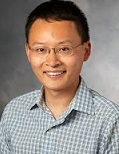 |
James Zou |
James Zou is an Assistant Professor of Biomedical Data Science and, by courtesy, of Computer Science and Electrical Engineering at Stanford University. He works on a wide range of problems in machine learning (from proving mathematical properties to building large-scale algorithms) and is especially interested in applications in genomics and computational health. He received a Ph.D. from Harvard in 2014 and was a member of Microsoft Research New England. Before this, he completed Part III in math at the University of Cambridge and was a Simons fellow at U.C. Berkeley.
He joined Stanford in Fall 2016 and was excited to be an inaugural Chan-Zuckerberg Investigator. He leads the Stanford
Laboratory for Machine Learning, Genomics and Health. They are also a part of the Stanford AI Lab.
 |
Junshan Zhang |
Junshan Zhang received his Ph.D. degree from the School of ECE at Purdue University in 2000. He joined the School of ECEE at Arizona State University in August 2000, where he has been Fulton Chair Professor since 2015. His research interests fall in the general field of information networks and data science, including communication networks, Internet of Things (IoT), Fog Computing, social networks, smart grid. His current research focuses on fundamental problems in information networks and data science, including Fog Computing and its applications in IoT and 5G, IoT data privacy/security, optimization/control of mobile social networks, stochastic modeling and optimization for smart grid..
Prof. Zhang is a Fellow of the IEEE, and a recipient of the ONR Young Investigator Award in 2005 and the NSF CAREER award in 2003. He received the IEEE Wireless Communication Technical Committee Recognition Award in 2016. His papers have won a few awards, including the Best Student paper at WiOPT 2018, the Kenneth C. Sevcik Outstanding Student Paper Award of ACM SIGMETRICS/IFIP Performance 2016, the Best Paper Runner-up Award of IEEE INFOCOM 2009 and IEEE INFOCOM 2014, and the Best Paper Award at IEEE ICC 2008 and ICC 2017. Building on his research findings, he co-founded Smartiply Inc in 2015, a Fog Computing startup company delivering boosted network connectivity and embedded artificial intelligence.
Prof. Zhang was TPC co-chair for a few major conferences in communication networks, including IEEE INFOCOM 2012 and
ACM MOBIHOC 2015. He was general chair for ACM/IEEE SEC 2017, WiOPT 2016, and IEEE Communication Theory Workshop 2007.
He is currently serving as an editor-at-large for IEEE/ACM Transactions on Networking and an editor for IEEE Network
Magazine.
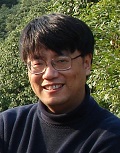 |
Lang Tong |
Lang Tong is the Irwin and Joan Jacobs Professor of Engineering and the site director of Power Systems Engineering Research
Center (PSERC) at Cornell University. His current research focuses on optimization, signal processing, and machine learning
in energy and power systems. A Fellow of IEEE, he is the 2018 Fulbright Distinguished Chair in Alternative Energy.
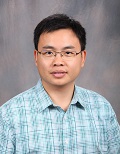 |
Le Xie |
Le Xie is a Professor and Eugene Webb Faculty Fellow in the Department of Electrical and Computer Engineering at Texas A&M University. He received B.E. in Electrical Engineering from Tsinghua University, S.M. in Engineering Sciences from Harvard, and Ph.D. in Electrical and Computer Engineering from Carnegie Mellon in 2009. His industry experience includes ISO-New England and Edison Mission Energy Marketing and Trading. His research interest includes modeling and control in data-rich large-scale systems, grid integration of clean energy resources, and electricity markets.
Dr. Xie received the U.S. National Science Foundation CAREER Award, and DOE Oak Ridge Ralph E. Powe Junior Faculty
Enhancement Award. He was awarded the 2017 IEEE PES Outstanding Young Engineer Award. He was recipient of Texas A&M Dean
of Engineering Excellence Award, ECE Outstanding Professor Award, and TEES Select Young Fellow. He is an Editor of IEEE
Transactions on Smart Grid, and the founding chair of IEEE PES Subcommittee on Big Data & Analytics for Grid Operations.
He and his students received the Best Paper awards at North American Power Symposium and IEEE SmartGridComm. He recently
chaired the 2018 NSF Workshop on Real-time Learning and Decision Making in Dynamical Systems.
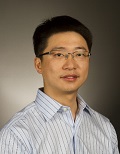 |
Lei Ying |
Lei Ying received his B.E. degree from Tsinghua University, Beijing, China, and his M.S. and Ph.D in Electrical and Computer Engineering from the University of Illinois at Urbana-Champaign. He currently is a Professor at the School of Electrical, Computer and Energy Engineering at Arizona State University, and an Associate Editor of the IEEE Transactions on Information Theory.
His research interest in the area of stochastics for big-data systems, including large-scale communication/computing systems for big-data processing, private data marketplaces, and large-scale graph mining. He coauthored books Communication Networks: An Optimization, Control and Stochastic Networks Perspective, Cambridge University Press, 2014; and Diffusion Source Localization in Large Networks, Synthesis Lectures on Communication Networks, Morgan & Claypool Publishers, 2018.
He won the Young Investigator Award from the Defense Threat Reduction Agency (DTRA) in 2009 and NSF CAREER Award in 2010.
He was the Northrop Grumman Assistant Professor in the Department of Electrical and Computer Engineering at Iowa State
University from 2010 to 2012. His papers have received the best paper award at IEEE INFOCOM 2015 (paper), the Kenneth C.
Sevcik Outstanding Student Paper Award at ACM SIGMETRICS/IFIP Performance 2016 (paper), been selected in ACM TKDD Speical
Issue “Best Papers of KDD 2016” (paper), received the WiOpt’18 Best Student Paper Award, and selected for Fast-Track Review
for TNSE at IEEE INFOCOM 2018 (7 out of 312 accepted papers were invited).
 |
Marco Scarsini |
Marco Scarsini is a Professor in the Department of Economics and Finance at LUISS, Rome,
Italy. He obtained his Laurea in Economics and Social Sciences at Università Bocconi and his HDR in Applied
Mathematics and Applications of Mathematics at Université Paris Dauphine. He had previous appointments in
various universities, including SUTD. He has written over one hundred papers and serves on the editorial board of
several scientific journals. His main research areas are applied probability and game theory, with a particular focus
on congestion games and social learning.
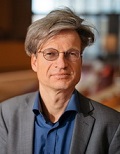 |
Martin Haardt |
Martin Haardt has been a Full Professor in the Department of Electrical Engineering and Information Technology and Head of the Communications Research Laboratory at Ilmenau University of Technology, Germany, since 2001. After studying electrical engineering at the Ruhr-University Bochum, Germany, and at Purdue University, USA, he received his Diplom-Ingenieur (M.S.) degree from the Ruhr-University Bochum in 1991 and his Doktor-Ingenieur (Ph.D.) degree from Munich University of Technology in 1996.
In 1997, he joined Siemens Mobile Networks in Munich, Germany, where he was responsible for strategic research for third generation mobile radio systems. From 1998 to 2001 he was the Director for International Projects and University Cooperations in the mobile infrastructure business of Siemens in Munich, where his work focused on mobile communications beyond the third generation. During his time at Siemens, he also taught in the international Master of Science in Communications Engineering program at Munich University of Technology.
In 2018, Martin Haardt has been named an IEEE Fellow “for contributions to multi-user MIMO communications and tensor-based signal processing.” He has received the 2009 Best Paper Award from the IEEE Signal Processing Society, the Vodafone (formerly Mannesmann Mobilfunk) Innovations-Award for outstanding research in mobile communications, the ITG best paper award from the Association of Electrical Engineering, Electronics, and Information Technology (VDE), and the Rohde & Schwarz Outstanding Dissertation Award. In the fall of 2006 and the fall of 2007 he was a visiting professor at the University of Nice in Sophia-Antipolis, France, and at the University of York, UK, respectively. His research interests include wireless communications, array signal processing, high-resolution parameter estimation, as well as numerical linear and multi-linear algebra.
Prof. Haardt has served as an Associate Editor for the IEEE Transactions on Signal Processing (2002-2006 and 2011-2015), the IEEE Signal Processing Letters (2006-2010), the Research Letters in Signal Processing (2007-2009), the Hindawi Journal of Electrical and Computer Engineering (since 2009), the EURASIP Signal Processing Journal (2011-2014), and as a guest editor for the EURASIP Journal on Wireless Communications and Networking as well as the IEEE Journal of Selected Topics in Signal Processing.
Since 2011 he has been an elected member of the Sensor Array and Multichannel (SAM) technical committee of the IEEE Signal Processing Society,
where he currently serves as the Chair (since 2017). Moreover, he has served as the technical co-chair of PIMRC 2005 in Berlin, Germany,
ISWCS 2010 in York, UK, the European Wireless 2014 in Barcelona, Spain, as well as the Asilomar Conference on Signals, Systems,
and Computers 2018, USA, and as the general co-chair of WSA 2013 in Stuttgart, Germany, ISWCS 2013 in Ilmenau, Germany, CAMSAP 2013 in
Saint Martin, French Antilles, WSA 2015 in Ilmenau, SAM 2016 in Rio de Janeiro, Brazil, CAMSAP 2017 in Curacao, Dutch Antilles, and
SAM 2020 in Hangzhou, China.
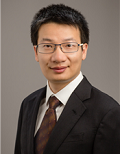 |
Ruoyu Sun |
Ruoyu Sun is an assistant professor in the Department of Industrial and Enterprise Systems Engineering Department (ISE)
and Coordinate Science Lab (CSL), University of Illinois at Urbana-Champaign. His recent research interests lie in
large-scale optimization and non-convex optimization in machine learning. Before joining UIUC, he was a visiting scientist
at Facebook AI Research and was a postdoctoral researcher at Stanford University. He obtained PhD in electrical engineering
from University of Minnesota, and B.S. in mathematics from Peking University. He has won the second place of INFORMS
George Nicholson student paper competition, and honorable mention of INFORMS optimization society student paper competition.
 |
Wing-Kin Ma |
Wing-Kin (Ken) Ma is a Professor with the Department of Electronic Engineering, The Chinese University of Hong Kong.
His research interests lie in signal processing, optimization and communications. His most recent research focuses on
two distinctive topics, namely, structured matrix factorization for data science and remote sensing, and MIMO
transceiver optimization. Dr. Ma is active in the Signal Processing Society. He served as editors of several
journals, e.g., Senior Area Editor of IEEE Transactions on Signal Processing, Lead Guest Editor of a special
issue in IEEE Signal Processing Magazine, to name a few. He is currently a member of the Signal Processing for
Communications and Networking (SPCOM) Technical Committee. He received Research Excellence Award 2013–2014 by
CUHK, the 2015 IEEE Signal Processing Magazine Best Paper Award, the 2016 IEEE Signal Processing Letters Best
Paper Award, and a 2018 IEEE Signal Processing Best Paper Award. He is an IEEE Fellow and is currently an
IEEE SPS Distinguished Lecturer.
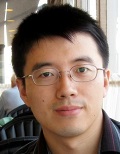 |
Wotao Yin |
Wotao Yin is an applied mathematician and professor in the Mathematics department at the University of California, Los Angeles in Los Angeles, California. He currently conducts research in optimization, parallel and distributed computing, and inverse problems.
Wotao Yin received his PhD in operations research at Columbia University in 2006 under the supervision of Donald Goldfarb. His dissertation title was The TV-L1 Model Theory, Computation and Applications.
In 2016, Wotao Yin was awarded the gold Morningside Gold Medal at the International Congress of Chinese Mathematicians,
which is awarded to “outstanding mathematicians of Chinese descent to encourage them in their pursuit of mathematical truth”.
He was also awarded an NSF CAREER award in 2008, and was made an Alfred P. Sloan Fellow in 2009.
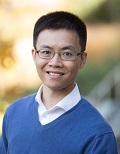 |
Yudong Chen |
Yudong Chen is an assistant professor at the School of Operations Research and Information Engineering (ORIE),
Cornell University. Before joining Cornell, he was a postdoctoral scholar at the Department of Electrical Engineering and
Computer Sciences at University of California, Berkeley. He obtained his Ph.D. in Electrical and Computer Engineering from
the University of Texas at Austin, and his M.S. and B.S. from Tsinghua University. His work has received the NSF CRII award
and the second place in the INFORMS Nicholson Student Paper Competition. His research interests include machine learning,
high-dimensional and robust statistics, convex and non-convex optimization, and applications in communication and computer networks.
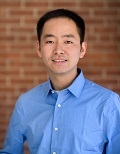 |
Yuxin Chen |
Yuxin Chen is currently an assistant professor in the Department of Electrical Engineering at Princeton University. Prior to joining Princeton, he was a postdoctoral scholar in the Department of Statistics at Stanford University, and he completed his Ph.D. in Electrical Engineering at Stanford University. His research interests include high-dimensional statistics, convex and nonconvex optimization, statistical learning, and information theory. He received the 2019 AFOSR Young Investigator Award.